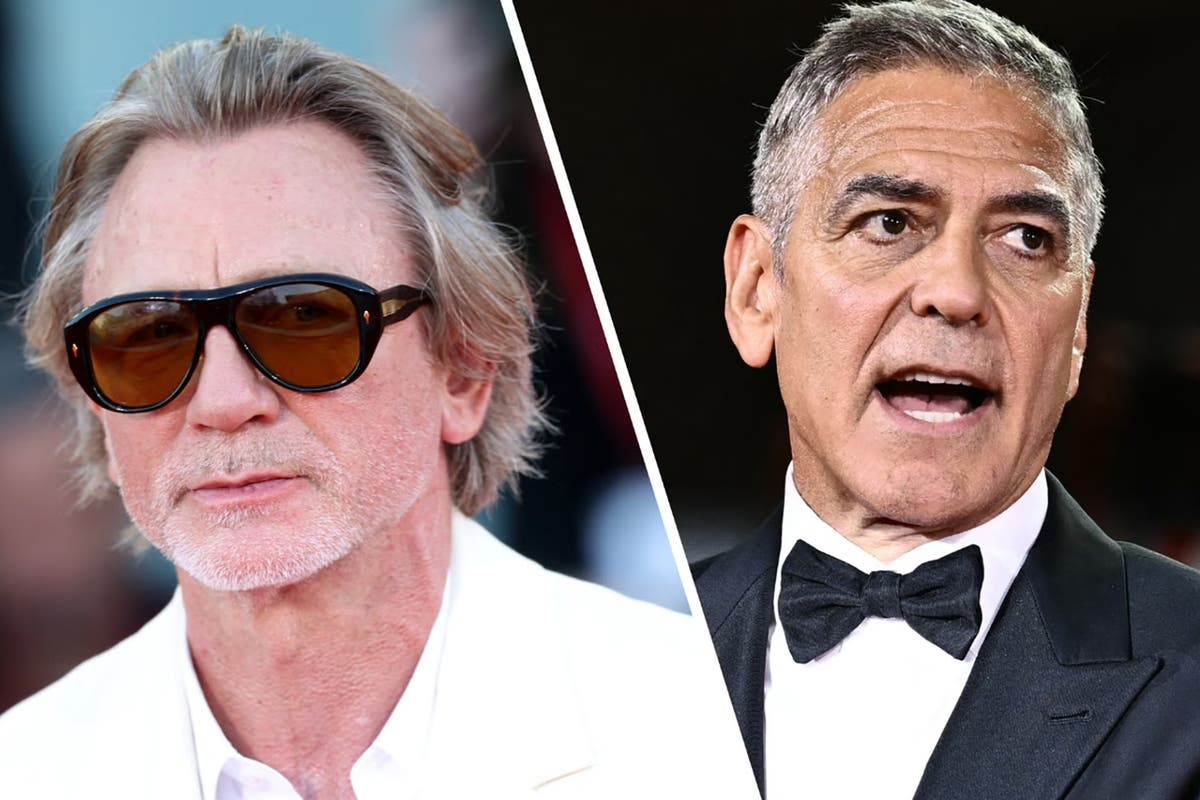Daniel Craig gives a performance for the ages – specifically the middle-ages – in his new film Queer, adapted by Luca Guadagnino from the William S Burroughs novel and set in a pungent post-war Mexico City. The 56-year-old former Bond plays William Lee, a man of faded charisma and slipped-gear authority. Lee is verbose and needy, drunk and desperate. He’s rattling from cafe to bar, pursuing boys half his age. Queer is a film of overflowing ashtrays, rumpled suits and fragile spectacles thrown aside on the bed. But mostly it’s focused on Craig, an alpha male playing beta, a movie star who’s growing old. It frames the actor’s weatherbeaten face as though it’s a sunset to gawk at.
As luck would have it, Queer premiered at this week’s Venice film festival just 48 hours after Jon Watts’s flyweight buddy comedy Wolfs, which casts Brad Pitt and George Clooney as two New York fixers who find themselves called to the same clean-up job. The first big joke of Wolfs is that Pitt and Clooney are essentially identical, interchangeable. Both sport greying facial hair and wear black leather jackets: the regulation uniform of the moneyed silverback gorilla who feels he’s still in possession of his mojo. “You’re basically the same guy,” quips the New York kid who becomes their sidekick – and never mind the fact that each man regards the other as a cheap copycat.
Wolfs’ second big joke, though, is that the stars have grown old. Pitt is now 60 (older, incidentally, than vice-presidential candidate Tim Walz). Clooney is three years his senior. Watts’s script has them running energetically around town, huffing and puffing, complaining about their stiff backs. The characters not only use pagers; they have to reach for their specs in order to read each new message. Pitt and Clooney gamely play along, but the film remains a gentle, indulgent affair that never dares to undermine their dignity. Watts directs Wolfs as though he’s playing a round of golf with his bosses. He might risk the odd joke at their expense, but he’s shrewd enough to let them win through at the end.
Themes of ageing, infirmity and death dominated the films this year at Venice, but their leading men, by and large, sought to defuse the issue with a gag, or ploughed on as though it was business as usual. Chief among these was Kevin Costner, channelling the ghosts of John Wayne and Gary Cooper with part two of his epic, old-school western, Horizon: An American Saga. Costner turned 69 last birthday but you’d never know it from the film, given that his hero can nonchalantly beat up cowboys in their prime and bed women young enough to be his daughter. Pitt and Clooney lightly referenced their advancing years. Costner bulldozed right past it and dared us to call him out.
The women fared better, in that they tackled the mortality issue head on. Babygirl starred Nicole Kidman as a middle-aged CEO who embarks on a reckless affair with her twentysomething intern. Angelina Jolie’s Maria gave us the last days of a diva. Tilda Swinton and Julianne Moore discussed euthanasia in Pedro Almodovar’s The Room Next Door. All of these actors gave fine, bold performances. All came away with excellent reviews. And yet I was always conscious that what these women were giving were fine, bold performances. Whereas with Craig, one forgets. His acting in Queer is so quietly agonised – so nuanced, open and vulnerable – that it never really feels as though he’s acting at all. This naturally makes him a rarity. “Daniel,” Guadagnino explained at the fest, “is one of the very few iconic actors who allow their fragility to be seen.”
How strange that an actor who made his millions playing cinema’s ultimate alpha male should now be the one to best embody its opposite. Or possibly it’s not strange at all. Maybe it’s just the karmic, corrective journey that we all take to greater or lesser degrees as we shuffle from youth towards old age, and from self-assurance to self-doubt. Much of the time this journey isn’t pretty. But Queer, to its credit, is able to paint the failing flesh as high art.

Walk 10 minutes from the Mussolini-era casino in which the festival takes place and one arrives at the shuttered Grand Hotel des Bains, the location for Luchino Visconti’s Death in Venice. It was here that 50-year-old Dirk Bogarde, playing a lovesick composer, sweated henna down his face, groped for a boy on the beach and dropped dead in his deckchair. This year’s event has been a veritable festival of Dirk Bogardes, as the moneyed middle-aged stars of today flirt with the idea of their own obsolescence. The deckchair, no doubt, is waiting out there for us all. We can nervously circle it, or try to ignore it – or we can launch ourselves at it like Craig, make the beach our stage and bow out in a blaze of grubby glory.

